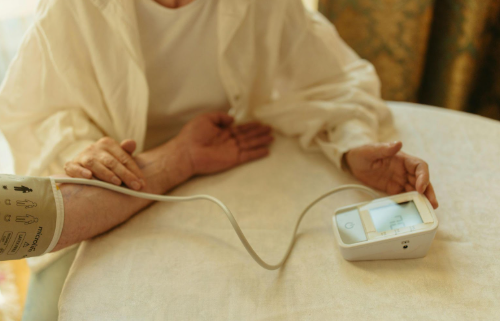The Comfort of Care: 5 Benefits of Receiving Medical Care at Home

For many people, the idea of medical care brings to mind hospitals, clinics, and long waiting room visits. But what if care could come to you? Receiving medical care at home has become an increasingly popular option for individuals who need regular treatment, recovery support, or chronic condition management.
In-home medical care offers a range of benefits that go beyond convenience for people such as elderly parents, a loved one recovering from surgery, or someone with mobility challenges. It provides a level of comfort, familiarity, and personalized attention that traditional healthcare settings simply cannot match.
The Power of Familiar Surroundings
One of the most significant benefits of receiving medical care at home is the healing power of familiar surroundings. Hospitals can feel cold and clinical, filled with the constant noise of machines, unfamiliar faces, and a general sense of discomfort. In contrast, the home environment fosters relaxation and emotional well-being.
Being in a familiar space surrounded by personal belongings, family members, and even pets can reduce stress and anxiety, making recovery smoother and more effective. In fact, sometimes patients can heal faster at home simply because they feel safer and more in control of their environment. Whether recovering from surgery, managing a chronic illness, or undergoing therapy, the comfort of home can play a big part in the overall health and recovery of a patient.
More Attention, Better Outcomes
In a hospital or clinic, medical professionals are often juggling multiple patients at once. While they do their best to provide quality care, the reality is that attention is divided, and time is limited. At home, care is more personalized, and patients receive one-on-one attention tailored to their specific needs.
A dedicated nurse, therapist, or home health aide can focus entirely on the individual, adjusting treatments and providing hands-on support that caters to their unique condition. Whether it’s wound care,
physical therapy, medication management, or regular health monitoring, this kind of individualized attention leads to better health outcomes. Additionally, caregivers and family members can be more involved, ensuring that their loved one receives the highest level of care possible.
A Safer Alternative to Hospitals
Hospitals, while extremely important for critical care, are also hotspots for infections. With so many patients in one place, the risk of exposure to bacteria and viruses is significantly higher. For individuals with weakened immune systems, such as seniors, post-surgical patients, or those with chronic conditions, hospital-acquired infections can be a serious concern.
Receiving care at home dramatically lowers this risk. Without the exposure to multiple patients, shared medical equipment, and high-traffic areas, individuals can recover in a cleaner, controlled environment. This is especially important for those with conditions that make them more vulnerable to infections, such as respiratory illnesses or compromised immune systems.
Home care helps reduce the risk of infections in the following ways:
- Limited exposure to contagious illnesses from other patients
- Cleaner environment with fewer shared medical instruments
- Controlled visitor interactions, reducing the chance of spreading germs
For many patients, staying at home for medical treatment isn’t just about comfort—it’s about safety. Avoiding unnecessary hospital stays can prevent complications and allow the body to heal without additional health risks.
Increased Independence and Control Over Care
One of the biggest fears for many people who need medical treatment is losing their independence. Being admitted to a hospital or care facility often means following strict schedules, limited mobility, and a reliance on staff for basic needs. Home care allows patients to maintain more control over their daily routines while still receiving necessary medical attention.
Patients can decide when and how they receive care by scheduling nurse visits at convenient times, participating in therapy in a familiar setting, or simply continuing daily activities with the support of a caregiver. This level of autonomy can be incredibly beneficial for mental health, providing a sense of normalcy and dignity during recovery or long-term care.
For seniors, in particular, home care enables them to stay in their homes longer rather than transitioning to an assisted living facility. This ability to age in place not only improves quality of life but also allows them to remain in a setting where they feel most comfortable and independent.
Cost-Effective Care Without Compromising Quality
Medical care can be expensive, especially when it involves hospital stays, rehabilitation centers, or long-term care facilities. Home-based care is often a more cost-effective alternative, providing the necessary medical support without the high costs associated with inpatient care.
Hospital stays can lead to significant expenses, from room charges to additional medical procedures that might not be necessary in a home setting. Home health care allows patients to receive treatments, therapy, and monitoring at a fraction of the cost, all while maintaining a high standard of medical attention. Many insurance plans, including Medicare and Medicaid, offer coverage for home health services, making it an accessible option for many families.
Additionally, home care reduces indirect costs, such as transportation to and from medical appointments, hospital meals, and lost wages from family members taking time off work to provide support. With home care, medical expenses are more predictable, and families can better manage their healthcare budgets.
Home Care As a Growing Trend
The healthcare industry is evolving, with a growing emphasis on patient-centered care. More people are realizing that high-quality medical treatment doesn’t always have to take place in a hospital or clinic. As technology advances, telemedicine, remote monitoring, and in-home medical devices are making it even easier for individuals to receive professional medical attention without leaving their homes.
Home-based medical care is no longer just an option for the elderly or those with chronic conditions—it’s becoming a preferred choice for post-surgical recovery, rehabilitation, and even palliative care. At
Five Star Home Health Care Agency, we offer at-home services to those who need it most; if you’re interested in receiving care in the comfort of your own home,
contact us today to find out more!










